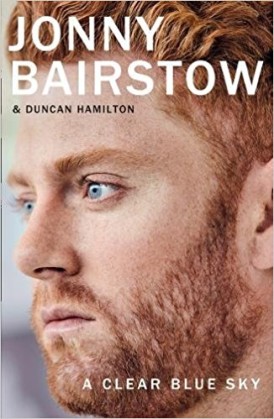A Clear Blue Sky
Martin Chandler |Published: 2017
Pages: 309
Author: Bairstow Jonny and Hamilton, Duncan
Publisher: Harper Collins
Rating: 5 stars

Jonny Bairstow is 28 and has played in 45 Test matches. He is England’s incumbent wicketkeeper batsman and his stock is on the rise, although he has not always been sure of his place. It is the sort of background that will shift a few copies of an autobiography. The fact the book is a collaboration with Duncan Hamilton, as good a cricket writer as we have today, will sell a few more. There is, however, no getting away from the fact that mid-career life stories from current players are usually disappointing.
In many ways it must be the case that Bairstow would be the happier if his story did tend towards the mundane. In truth, however, by dint of the loss of his father in such tragic circumstances A Clear Blue Sky is lifted well clear of the rest of the genre, and whilst I doubt that it will find too many readers who have no interest in the game at all I suspect, provided the publishers’ marketing department do their job properly, that in years to come there will be a fair number for whom it will be the only cricket book they have ever read.
The book is as much about Dad David as it is about Jonny. Teammate Phil Carrick, another man who died far too young, said of Bairstow Senior; he wasn’t a great batsman, he wasn’t even a great wicketkeeper, but he was a great cricketer. That greatness won him four Test caps, a tally Jonny overtook six months after his debut. His cricketing ability aside David was an enormously popular man. For those who didn’t know him it was just because of the way he played the game. He never gave less than 100%, and his boundless enthusiasm was obvious in everything he did. For those who did know him he was summed up succinctly by Geoffrey Boycott, who described him as the sort of bloke you would want guarding your back in a dark alley.
Jonny was just eight years of age when David took his own life. To read the story from his perspective is as thought provoking as anything I can remember appearing in print before. There were many good times to go with the tragic end, and David’s life and times fill most of the first third of the book. He’s never too far away in the rest of the story, however, there being frequent comparisons drawn between the careers of the pair. All are interesting, and one particularly poignant, that being the observation that the Bairstows were the thirteenth father and son to play for England, but the first such pairing where the father was not on the ground when the son made his debut.
The story begins, as seems to be the trend with a number of recent books, with a career defining moment, in this case the unbeaten 150 Jonny scored against South Africa at Durban in January 2016. We are less than two years on from then, but England have played more than twenty Tests since and Jonny’s batting average has gone up 11 points, and he has become an integral part of the team. There would seem to be no reason why it cannot carry on climbing for a few seasons yet. In light of the slings and arrows that have been thrown in his direction he seems to be a remarkably grounded man, and firmly in charge of his own destiny.
From Durban, Hamilton moves back to David’s story before taking us through Jonny’s career. One complaint often levelled at current players’ ‘autobiographies’ is the lack of spark in what is written, and the absence of controversial opinions. A Clear Blue Sky is no different, but the quality of the narrative and the sidelights on David’s career ensure a reader’s interest is never lost. Indeed as a rule Jonny has only good things to say about teammates and opponents alike. Ian Bell, James Taylor and Mitchell Johnson in particular receive many plaudits.
Family is clearly something that is an integral part of Jonny’s life and he, more than most, will value the relationships he has. The book was always going to dwell on David, and there are many mentions of the mother and sister and the already close bonds that became even stronger after David’s death. But there is no real mention of half brother Andrew. It was an omission that struck me as odd in the chapter on Jonny and David in James Buttler’s Following On, but the more so here. The obvious answer would be that the fourteen year age gap and the two boys being from different families created an unbridgeable schism. Quite why Andrew’s involvement is so peripheral is never made clear, although those mentions he does get, and the more so the generous thanks he is given in the acknowledgments at the end of the book, make it quite clear the brothers are close. I am left to assume that Andrew is simply a very private man.
A Clear Blue Sky is a book that is going to pick up a lot of awards over the coming months, and deservedly so. It is a compelling read, so much so that it has even caused me to discard the Review Team grumpy hat and not mark it down for lacking an index, statistics and not using art paper for the photographs. For anyone planning to read just one cricket book this year then my advice, assuming they won’t reconsider such a poor decision, is to make it this one.






Leave a comment